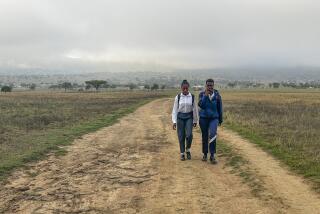An Opening in Pretoria
- Share via
The South African black parents’ proposal for a three-month suspension of the school boycott poses an extraordinary test of South African government intentions and offers at the same time a unique opportunity for negotiations to end apartheid peacefully.
The Soweto Parents’ Crisis Committee demands are reasonable, even modest, given the anger that the black majority feels in the face of racial repression. The demands take on great significance because they are endorsed by the African National Congress, the first such political engagement since the ANC was banned.
At least 10% of 1.8 million black students in the urban areas of South Africa were observing the boycott when schools were recessed in October. That vast group of angry youths had fueled the rising violence in the growing resistance to apartheid. A suspension of the boycott would contribute to a period of calm.
The conditions asked by the parents include suspension of the state of emergency, withdrawal of military forces from black residential areas, creation of new parent associations, popular election of student councils, legalization of the Congress of South African Students and reinstatement of dismissed and transferred faculty members who had supported the boycott.
Those demands only begin to address the broader issues of apartheid that have created blatantly inferior schools for the black majority. They could nevertheless be a useful beginning in the process of dismantling apartheid through dialogue rather than bloody revolt.
“Although our initial focus is getting the kids back in school for their own sake and the good of the community, a lot more is riding on this effort,” one Soweto parent said. “If all this works, we could build on that success, but if it fails, then, I am afraid, disillusionment within the black community would probably be total.”
Even with ANC endorsement, even with the approval of Bishop Desmond Tutu, the suspension of the boycott may not be respected by the students themselves. In some regions black parents have been denied government permission to organize the very meetings that would facilitate an end to the boycott.
But the greatest uncertainty lies with the government in Pretoria, and whether it will finally recognize in this gesture the opportunity for peaceful transition that it represents, or whether the leaders will continue to give no more than lip service to their commitment to justice for all.
This is not an open-ended offer. The blacks, who are making the proposal at no small risk to themselves, have set the end of March as the deadline for government action on their demands. Failure to respond positively in the next three months would without question be a severe, probably fatal, blow to the prospects for negotiating the end of apartheid. Failure to respond positively would reinforce the militants among the blacks, broaden the boycott and bring, as Tutu himself has warned, a general strike and support for “punitive economic sanctions” from even the most moderate elements within the black majority.
As our correspondent Michael Parks wrote from Johannesburg, the unanimous proposal of the community leaders for suspension of the boycott “is one of the most significant political developments here in recent months.” On the part of the blacks, he noted, this is the broadest cross-section assembled in recent years. Now, surely, the blacks are asking: To what purpose? And only the whites ruling in Pretoria can answer that question.
More to Read
Sign up for Essential California
The most important California stories and recommendations in your inbox every morning.
You may occasionally receive promotional content from the Los Angeles Times.










